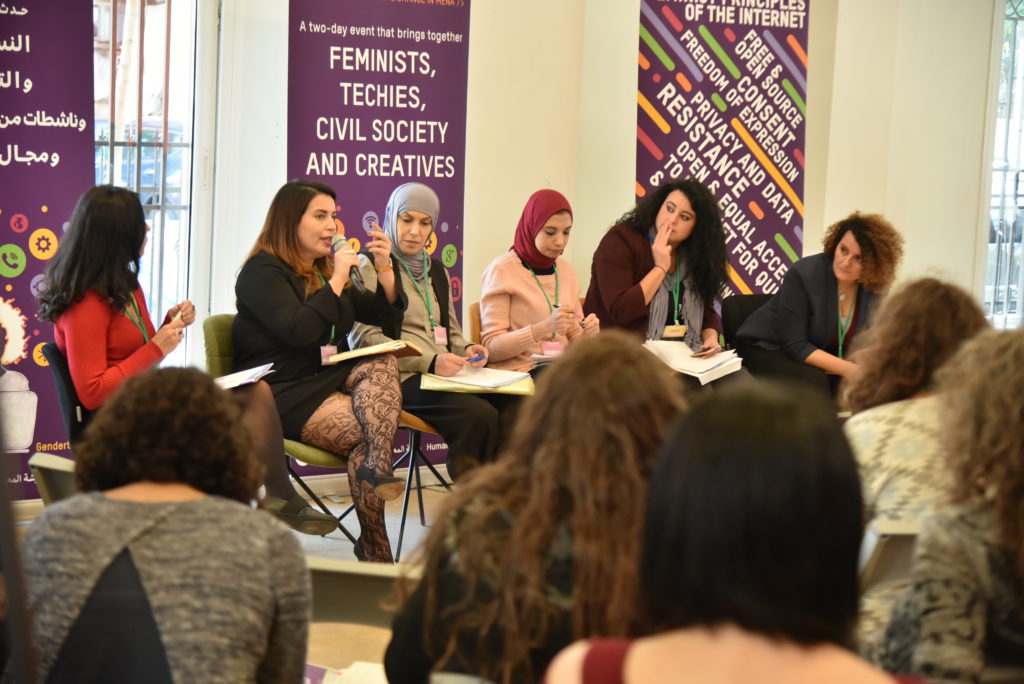Feature image viaOxfam/The Media Booth, November 24, 2017, Beirut, Lebanon: Arab feminists discuss how to counter online violence.
Is the internet providing more space for women to liberate themselves, or expanding the space for gender-based violence? To mark the international “16 Days of Activism Against Gender-Based Violence” campaign, Oxfam, in collaboration with SMEX and the Knowledge Workshop, a Beirut-based ongoing workshop for (re)searching and gathering women’s stories, organized “Gender Tech,” a two-day event held in Beirut to discuss women’s engagement in online spaces and their right to access them safely.
Over 100 feminists, techies, and civil society actors from across the Middle East and North Africa (MENA) came together to tackle online harassment and abuse, faced by almost a quarter of women around the world.
In a lively panel on ways to counter online violence, speakers elaborated on the threats women face online, which range from stalking and rape threats, to creating fake profiles to damage one’s reputation, and revenge postings of intimate photos or conversations.
These sorts of attacks, said Esraa Fahead, executive director of Horeya for Human Rights Organization in Port Said, can and have led women to commit suicide.
The response, Lebanese political activist Diala Haidar offered, is to create and support feminist platforms that are not controlled and monitored by corporations or governments. Haidar added that women must also have a say in internet policies that regulate and impact their experiences online.
Shaping the structure of the internet is one part of the solution while taking ownership of its content is another. Farah Barkawi, a journalist working on a new project called Wikigender, said preserving and disseminating feminist ideas is “a type of resistance.”
Other speakers agreed that expanding the volume and scope of Arabic-language feminist content online is essential to facing gender inequality. The understanding that documentation and archiving is an act of resistance was brought up again by archivist Hana Sleiman during her workshop on feminist archiving and oral history.
Indexing and cataloging archival material is an important component of preserving collective memories for future generations, Sleiman contends.
From archiving to translating, speakers and participants were in agreement that content published online must be accessible to all while challenging patriarchal notions, maintaining Arabic grammatical and linguistic conventions, and localizing concepts.
During a workshop on a newly translated version of APC’s Feminist Principles of the Internet, participants engaged in interesting debates on the transliteration of newly coined terms and expressions, translation of gender terminology, and use of academic jargon. While there was little consensus by the end of the session on how to best translate the feminist principles, Sara Abu Ghazal, co-director of the Knowledge Workshop, spoke of the significance of having such open conversations. “It is important for all of us to sit and produce knowledge collectively … to have peer reviews from our friends,” Abu Ghazal noted.
But where should this knowledge be published? Corporate control of the internet and the narrowing of digital spaces came up repeatedly during the event. How can feminists organize on profit-driven platforms that have a history of undermining and censoring critical or controversial voices.
Lebanese activist Nadine Moawad said that Facebook and Google pretend to be friends to their users, particularly vulnerable ones, while these companies “actually hold their users hostage.” Moawad said that while there is a need to create safe social media platforms, there is value in fostering connections outside of social media.
Tara Tarakiyee, a program manager at the Open Technology Fund, warned that once big companies completely “control the infrastructure of the internet, there might be no going back,” and advocated for the use of decentralized open-source social networks. Migrating to platforms like Mastodon, an alternative to Twitter, allows users to gain control of their online communities and establish rules that could create harassment-free digital spaces.
On the second day of “Gender Tech,” participants went from discussing alternatives to designing them. During a day-long hackathon led by Humanity X, a Netherlands-based support team that helps develop technology for social good, participants envisioned several solutions to gender-based violence.
The proposals include “Smart Stands” in schools, which would provide educational resources to students and teachers; an app that tracks and reports on online harassment in real time; and awareness-building tech-driven campaigns to fill data gaps and assist those most impacted by violence.


